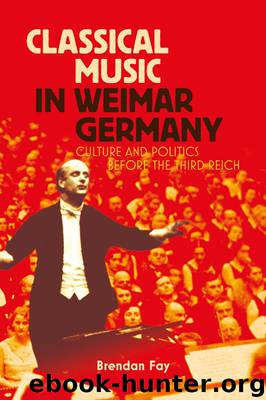Classical Music in Weimar Germany by Brendan Fay;

Author:Brendan Fay;
Language: eng
Format: epub
Publisher: Bloomsbury UK
Image 12 Poster for the 1938 Entartete Musik Exhibition. Source: Voix Ettouffées, Wikimedia Commons. Image Retrieved from https://commons.wikimedia.org/wiki/File:Entartete_Musik.png.
In terms of his academic publications, Nazi cultural critics, though often freely acknowledging the learnedness of his scholarship, shunned his work and espousal of claims which fit uncomfortably with Nazi ideology, not least his estimation of the important role played by Jewish composers in the course of Germany’s musical past. The brief entry for “Jewish Music” in the 1935 edition of his influential Musik-Lexikon matter-of-factly recounts the history of music within Jewish life since Biblical times with no anti-Semitic innuendo whatsoever.67 In his 1938 Kleine Deutsche Musikgeschichte (Short History of German Music), Moser claimed that following their emancipation in the early nineteenth century, Jewish artists had finally been able to make their full contribution to German musical life as embodied by the works of Meyerbeer, Mendelssohn, Offenbach, Joachim, Mahler, and Schoenberg, who “through their different natural styles had contributed in many different ways to German musical development. While Meyerbeer and Offenbach have, above all, influenced French music history, Mendelssohn and Joachim were themselves fully connected to German musical life.” As regards Mahler and Schoenberg, the latter of whom figured among the most radical modernists of the interwar period, Moser insisted that judgment “be left to a later generation to speak.”68 If his emphasis on the transnational foundations of German music had irked Nazi musicologists, for many this kind of pronouncement—as late as 1938, no less—on the contributions of Jewish composers to German musical life proved even more unforgiveable. A scathing 1936 review of the work by A. Krüll merits inclusion here in its entirety:
The considerable academic output of the well-known author in his three-volume History of German Music, which probably owes in no small measure to the model [set] by Scherer’s History of German Literature in terms of its inner structure, was at the same time a liability (Verpflichtung) for the future work of the author. Every cultural politician should have expected that Moser would have unconditionally started from the results of race and prevailing worldviews in his Short History of German Music since this work essentially represents a shortened version of his earlier History of German Music. Unfortunately, that is not the case. As much as we recognize through Moser the defense of the unjustified “confiscation” of Germany’s musical masters by the deliberately false statements of foreign “researchers”; as much as we appreciate his deftness and value his clarification of hypotheses made by other scholars. Still, all of this cannot mislead us as regards the errors and cultural-political unreliability of his latest work. Our standpoint is that books which intentionally adopt a wide-ranging framework demand absolute musical-political clarity. But what Moser has to say regarding the musical emancipation of the Jews in his Short History of German Music—associated with the names Mendelssohn, Meyerbeer, Offenbach, Joachim, Mahler, Schönberg—is forced upon the reader and completely falls outside the boundaries of our worldview. With his inclusion of the word “German” in the title of the book comes a certain obligation.
Download
This site does not store any files on its server. We only index and link to content provided by other sites. Please contact the content providers to delete copyright contents if any and email us, we'll remove relevant links or contents immediately.
| Appreciation | Blank Sheet Music |
| Composition | Conducting |
| Exercises | Instruction & Study |
| Lyrics | MIDI, Mixers, etc |
| Philosophy & Social Aspects | Songwriting |
| Techniques | Theory |
| Vocal |
The Goal (Off-Campus #4) by Elle Kennedy(13203)
Kathy Andrews Collection by Kathy Andrews(11328)
Diary of a Player by Brad Paisley(7270)
What Does This Button Do? by Bruce Dickinson(5933)
Assassin’s Fate by Robin Hobb(5856)
Big Little Lies by Liane Moriarty(5517)
Altered Sensations by David Pantalony(4868)
Pale Blue Dot by Carl Sagan(4620)
Sticky Fingers by Joe Hagan(3913)
The Death of the Heart by Elizabeth Bowen(3342)
The Heroin Diaries by Nikki Sixx(3322)
Beneath These Shadows by Meghan March(3151)
Confessions of a Video Vixen by Karrine Steffans(3101)
The Help by Kathryn Stockett(3021)
How Music Works by David Byrne(2965)
Jam by Jam (epub)(2880)
Harry Potter 4 - Harry Potter and The Goblet of Fire by J.K.Rowling(2805)
Strange Fascination: David Bowie: The Definitive Story by David Buckley(2702)
Petty: The Biography by Warren Zanes(2575)
